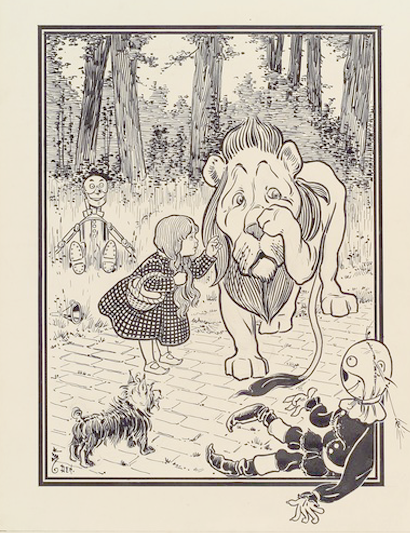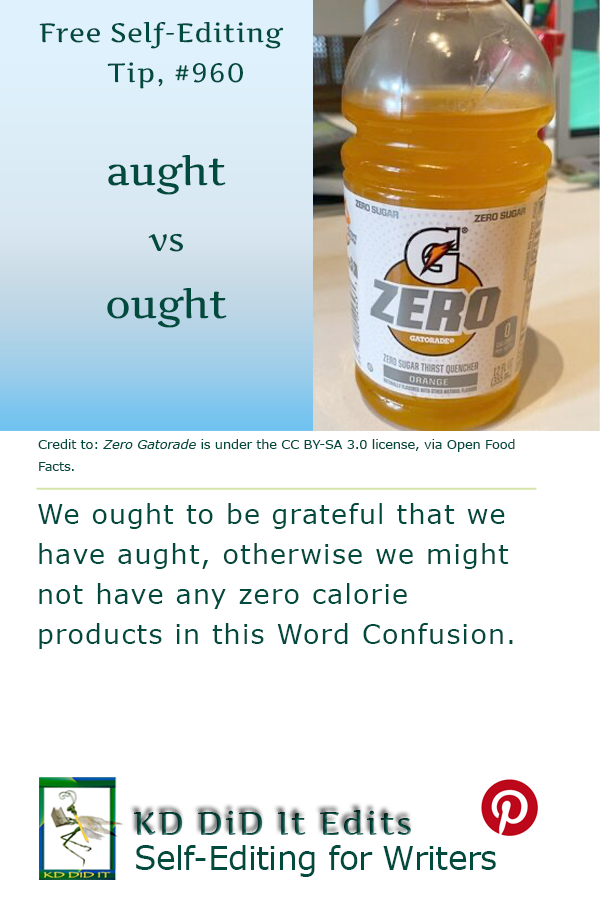It shall be aught if you don’t look this post over. Really, you ought to read all about this pair of heterographs (a subset of homophone). Although, I do have to confess that aught and ought do have a number of definitions in common…
Well, not to confuse you or anything, but aught and ought are fairly interchangeable…IF you’re writing a tale set in the historical past anyway.
Either aught or ought can be used for a pronoun and less commonly for the word nought. In fact, Garner, says that nought, which equaled a zero (0̸) back in the day, was mistaken as aught. Still, while aught is technically incorrect, it has been widely accepted to mean 0̸. So, yeah, interchangeable…
Playing off that misconception, aught is preferred when dealing with numbers (Garner).
Ought is, today, most commonly used with the prepositional to when it’s being used in the sense of an obligation, as in ought to. If you want to be negative, use ought not to.
Usage-wise, it would probably be best to use ought to express obligation, duty, or necessity; the desired or ideal; or, what is likely or probable.
Use should to express suitability or appropriateness — in particular, should not or shouldn’t should be used instead of ought not…
Another way to look at ought versus should is as a sense of formality. The former being more formal and the latter more casual. Of course if you want to give your character some, um, character, consider emphasizing those oughts — and the incorrect usage styles noted below, lol (Perlman).
| Correct Negative Usage | Incorrect Usage |
|---|---|
| We ought not to have ordered so much food. | We don’t ought to have ordered so much food. |
| You oughtn’t to have said that about his mother. | You didn’t ought to have said that about his mother. |
| Better Negative Usage | Not So Great |
| You shouldn’t speak to your father like that. | You oughtn’t to speak to your father like that. |
| Correct Usage as a Question | Incorrect Usage |
| Ought she to call the police? | Does she ought to call the police? |
| Ought we to be more worried about the environment? | Do we ought to be more worried about the environment? |
Word Confusions…
…started as my way of dealing with a professional frustration with properly spelled words that were out of context in manuscripts I was editing as well as books I was reviewing. It evolved into a sharing of information with y’all. I’m hoping you’ll share with us words that have been a bête noir for you from either end.
If you found this post on “Aught versus Ought” interesting, consider tweeting it to your friends. Subscribe to KD Did It, if you’d like to track this post for future updates.
| Aught | Ought |
|---|---|
| Credit to: Apple Dictionary.com; Definitions.net: aught; Dictionary.com: aught, ought; The Free Dictionary: aught; Lexico.com: aught; Wordnik.com: aught | |

Data is Collected on Everything We Do is Rhododendrites‘s own work and is under the CC BY-SA 4.0 license, via Wikimedia Commons. — We could re-word this title as Data is Collected on Aught We Do. |

You Ought to Be Ashamed of Yourself, 1901, by William Wallace Denslow, inspired by L. Frank Baum, and courtesy of the New York Public Library, which is in the public domain, via Picryl. |
| Part of Grammar: | |
| Adverb 1; Noun 1, 2; Pronoun 3
Plural for the noun: aughts A less common word for nought Variant pronoun: ought |
Noun 1, 2; Pronoun 3; Verb, modal 4 Plural for the noun: oughts * As a modal verb, ought does not change form. Negative form: ought not to, A less common word for nought Variant pronoun: aught |
| Adverb: [Archaic] In/to any degree
Noun:
[British] All Anything whatever
[US the aughts; Australia, British, New Zealand noughties] The decade from 2000 to 2009 2 Pronoun:
|
Noun: [Archaic] The digit 0̸ 1
Nonentity
[the aughts] The decade from 2000 to 2009 2 Duty or obligation Pronoun:
Verb, modal:
Used to indicate something that is probable |
| Examples: | |
| Adverb: “Is there aught,” she panted, “aught that could come between your soul and mine?” Drunken with the wine of success deep-quaffed, without superstition and without faith in aught but its own ascendant star, laughing at the wreckage of science and mad with pride of race, it went forth upon the way of war. ‘Cause his mum didn’t have no money to dress him in aught but a suit of rags, stitched up from scraps of handmedowns and castoffs what had been worn to nothing and chucked away. Far be it from me to gainsay thee in aught, for I am indebted to thee for many favors and bounties and much kindness. Noun: Their DVD was released in the early aughts. Back in the early aughts, he worked as a marketing specialist. Pronoun: In his report of the battle, Cromwell wrote, “it is, for aught I know, a crowning mercy”. For aught we know. Neither of his parents had aught but praise for him. |
Noun: “Why, I towld him av he guv the boys a promise, he oughts never to go back from his word.” – Anthony Trollope, The MacDermots of Ballycloran. “But don’t you see I have grown up outside the pale of duty and ‘oughts’.” – Elizabeth Cleghorn Gaskell, Wives and Daughters. “There are no oughts in my life which I have gotten from my father.” – Stephen Wise, Child versus Parent. Pronoun: For ought we know. Neither of his parents had ought but praise for him. Verb, modal: It ought not to be allowed. He ought to be able to take the initiative. You ought to go. Five minutes ought to be enough time. |
| History of the Word: | |
|
|
C’mon, get it out of your system, bitch, whine, moan…which words are your pet peeves? Also, please note that I try to be as accurate as I can, but mistakes happen or I miss something. Email me if you find errors, so I can fix them…and we’ll all benefit!
Satisfy your curiosity about other Word Confusions on its homepage or more generally explore the index of self-editing posts. You may also want to more generally explore the index of self-editing posts. You may also want to explore Formatting Tips, Grammar Explanations, Linguistics, Publishing Tips, the Properly Punctuated, Writing Ideas and Resources, and Working Your Website.
Resources for Aught versus Ought
Garner, Bryan A. Garner’s Modern American Usage. 3rd ed. Oxford University Press, 2009.
“Ought To.” Cambridge Dictionary. n.d. Web. 2 April 2021. <https://dictionary.cambridge.org/us/grammar/british-grammar/ought-to>.
“Ought vs Aught.” Homophones. Grammarist. n.d. Web. 2 April 2021. <https://grammarist.com/homophones/ought-vs-aught/>.
Perlman, Merrill. “Your Head Will Spin: Uses of naught, aught, and ought.” Columbia Journalism Review. 28 July 2014. Web. 2 April 2021. <https://archives.cjr.org/language_corner/language_corner_072814.php>.
Pinterest Photo Credits:
Zero Gatorade is under the CC BY-SA 3.0 license, via Open Food Facts.


